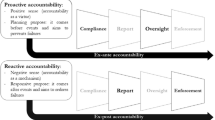Abstract
The relationship between knowledge and action is a fundamental one: a processor in a computer network (or a robot or a person, for that matter) should base its actions on the knowledge (or information) it has. One of the main uses of communication is passing around information that may eventually be required by the receiver in order to decide upon subsequent actions. Understanding the relationship between knowledge, action, and communication is fundamental to the design of computer network protocols, intelligent robots, etc. By looking at a number of variants of thecheating husbands puzzle, we illustrate the subtle relationship between knowledge, communication, and action in a distributed environment.
Similar content being viewed by others
References
Barwise J (1981) Scenes and other situations. J Philosophy, vol LXXVIII, pp 369–397
El Gamal A, Orlitsky A (1984) Interactive data compression. Proceedings of the 25th Annual Symposium on Foundations of Computer Science, pp 100–108
Fischer MJ, Lynch NA, Paterson MS (1983) Impossibility of distributed consensus with one faulty process. Proceedings of the 2nd ACM Symposium on the Principles of Database Systems
Gardner M (1984) Puzzles from other worlds, Vintage
Gamow G, Stern M (1958) Forty unfaithful wives, Puzzle Math. The Viking Press, New York, pp 20–23
Halpern JY, Fagin R (1985) A formal model of knowledge, communication, and action in a distributed system: preliminary version. Proceedings of the 4th ACM Symposium on the Principles of Distributed Computing, pp 224–236
Halpern JY, Moses Y (1984/86) Knowledge and common knowledge in a distributed environment. Proceedings of the 3rd ACM Symposium on the Principles of Distributed Computing, pp 50–61. Revised as IBM research report RJ 4421, January 1986
Konolige K (1984) Belief and incompleteness. SRI Artificial Intelligence Note 319, SRI International, Menlo Park, California
Author information
Authors and Affiliations
Additional information
Yoram Moses received a B.Sc. in mathematics from the Hebrew University, Jerusalem, in 1981, and a Ph.D. in computer science from Stanford University in 1986. He will be spending the 1985/6 school year as a post-doctoral fellow at MIT. His major research interests are distributed systems, artificial intelligence, and the methodological foundations of computer science.
Danny Dolev received a B.Sc. in physics from the Hebrew University Jerusalem in 1971, an M.Sc. in applied mathematics from the Weizmann Institute of Science, Israel in 1973, and a Ph.D. in computer science from the Weizmann Institute of Science in 1979. After two years as a post-doctoral fellow at Stanford and a year as a visiting scientist at IBM, he joined the Hebrew University, Jerusalem, in 1982. His major research interests are distributed computing, reliability of distributed systems, and algorithms.
Joe Halpern received a B.Sc. in mathematics from the University of Toronto in 1975, and a Ph.D. in mathematics from Harvard University in 1981. In between, he spent two years as the head of the mathematics department at Bawku Secondary School, in Ghana. After a year as a visiting scientist at MIT, he joined IBM in 1982. His major research interests are reasoning about knowledge, distributed computing, and logics of programs.
The work of this author was supported in part by DARPA contract N00039-82-C-0250
Rights and permissions
About this article
Cite this article
Moses, Y., Dolev, D. & Halpern, J.Y. Cheating husbands and other stories: A case study of knowledge, action, and communication. Distrib Comput 1, 167–176 (1986). https://doi.org/10.1007/BF01661170
Issue Date:
DOI: https://doi.org/10.1007/BF01661170




